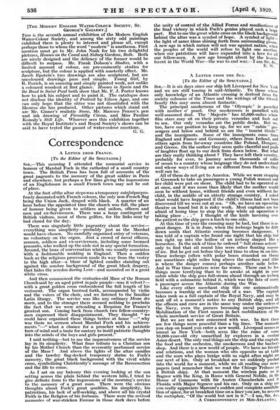A LETTER FROM THE SEA. [To the Editor of the
SPECTATOR.]
is six days since our ship left Liverpool for New York Rid we are still tossing in mid-Atlantic. To those, whose only, knowledge of an Atlantic crossing is derived from the li society columns of the Times and the writings of the Sitwell family this may seem almost fantastic. The principal smokeroom of the ' Olympic' is panelled with mother o' pearl. Our smokeroom is panelled with well-seasoned deal. The ` Majestic ' has 2.8,000-suites where film stars may sit on their private verandas and look out to sea. Our only verandas are the public decks. But we, too, have our position to keep up, for we are " cabin " pas_ sengers and below and behind us are the " tourist thirds " and the immigrants. Some of the immigrants come from England and France and Germany, others from Ireland, and others, again from far-away countries like Poland, Hungary, and Greece. On the surface they seem quite cheerful and peals of laughter float up to our deck from down below. But what are they really thinking about ? They have left their country, probably for ever, to journey across thousands of miles of ocean to a country whose language they do not understand and whose ways of living are as different from theirs as they well can be.
All of them do not get to America. While we were stopping at Greenock to take on passengers a young Polish woman and her child were put on shore. The child had to be operated on , at once, and it was more than likely that the mother would soon be without home, without friends and even without her child, in the middle of an utterly strange country. I asked what would have happened if the child's illness had not been discovered till we were out at sea. " Oh, we have an operating theatre on board but it is risky work. Most captains are too afraid of losing time to stop the ship while an operation is taking place . - " I thought of the knife hovering over the patient as the ship gave a lurch to one side. At this time of year the crossing may be bad, but there is no great danger. It is in June, when the icebergs begin to drift down south that Atlantic crossing becomes dangerous. I was told of a captain who found one night that his ship had run right, up into the hollow of an iceberg shaped like a horseshoe. In the nick of time he ordered " full steam astern only to find that all round him were other floating masses of ice. But he got out before they had time to close in on him. These icebergs (often with polar bears stranded on them) are sometimes eight miles long above the surface and (this is where the danger comes) perhaps another mile below. And in War time matters were far worse. There can' be few things more terrifying than to lie awake at night in your cabin while the ship goes full-steam ahead through an iceberg field with a submarine behind it, which was the fate of many a passenger across the Atlantic during the War. Like every other merchant ship this one automatically becomes a warship at the outbreak of a war. The captain takes rank as a full captain of the Royal Navy, and may be sent off at a moment's notice to any British ship, and all the officers and crew are in the same way under the orders of the Navy, even, the pursers becoming naval paymasters. Mobilization of the Fleet means in fact mobilization of the whole merchant service of Great Britain.
But we are not• now concerned with war. In fact there are few things more peaceful than a big liner. The moment you step on board you enter a new world. Liverpool seems as unreal as New York—both seem like the ruins of some 10,000-year-old city unearthed .by explorers in a central Asian desert. The only real things are the ship and the captain, the food and the orehestra, the smokeroom and the barber's shop. And there is a new world of people. We have no friends and relations, and the woman who sits opposite us at table and the man who plays bridge with us night after, night are our next of kin. Only at breakfast are we suddenly pushed into the world for a moment, while we sit reading our news- papers (and remember that we read the Chicago Tribune on a British ship). At that moment the wireless puts us in Bognor with the King, in Rome with General Nobile, in the House of Commons with Sir Austen Chamberlain and in Florida with Major Segrave and his ear. Only on a ship can you really appreciate Marconi's sudden and complete annihila- tion of space; for at breakfist time on a liner you are, to reverse the metaphor, "Of the world but not in it.' —I am, Sir, &C..
- A CORRESPONDENT IN MID-ATLANTIC.






































 Previous page
Previous page